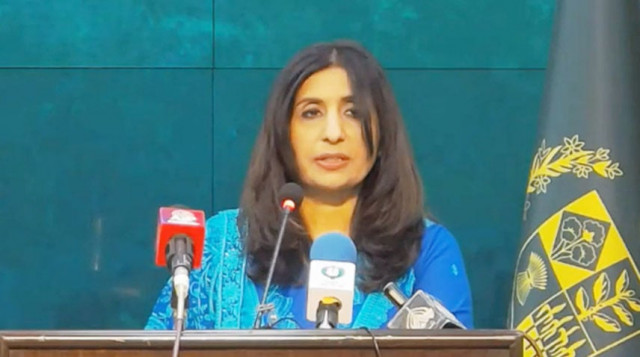Pakistan to recall ambassador from Iran after airspace violation: FO
Pakistan to suspend all high-level diplomatic exchanges with Iran, says Mumtaz Zahra Baloch

The Foreign Office (FO) announced on Wednesday that the country is recalling its ambassador from Iran in the aftermath of missile and drone strikes conducted in Panjgur by Tehran's forces.
🔴LIVE: Statement by the Spokesperson on Unprovoked Violation of its Air Space https://t.co/2tktEAcdst
— Spokesperson 🇵🇰 MoFA (@ForeignOfficePk) January 17, 2024
Pakistan condemned the attack, describing it as an “unprovoked violation” of the Pakistani airspace, and warned Tehran of serious consequences. The FO had said in a late-night statement that the violation of Pakistan’s sovereignty was completely unacceptable.
The strikes, which Tehran described as bases for the militant group Jaish al-Adl, in the Panjgur district of Balochistan killed two “innocent children” and wounded three girls.
"This illegal act is completely unacceptable and has not justification whatsoever. Pakistan reserves the right to respond to this illegal act and the responsibility for the consequences will lie squarely with Iran," said FO Spokesperson Mumtaz Zahra Baloch in a brief statement.
The spokesperson also added that Islamabad would suspend all high-level diplomatic exchanges with Tehran following the violation of the country's sovereignty and added that the Iranian envoy to Pakistan, who is currently visiting Iran, will not be allowed back in the country.
Read China urges Iran, Pakistan to 'exercise restraint' after deadly air strike
“We have conveyed this message to the government of Iran. We have also informed them that Pakistan has decided to recall its ambassador from Iran and that the Iranian ambassador to Pakistan, who is currently visiting Iran, may not return for the time being."
Iranian strike in Pakistan
Missiles targeted two bases of Jaish al Adl in Pakistan on Tuesday, Iranian state media reported, a day after Iran's elite Revolutionary Guards missile strikes hit an “Israeli spy centre” in Iraq and targeted Islamic State militants in Syria.
"These bases were hit and destroyed by missiles and drones," media reports in Tehran said. Iran's Nournews, affiliated with the country's top security body, said the attacked bases were located in the Balochistan province.
However, Pakistan contested Iran’s claims that the strikes destroyed “terrorist hideouts” and strongly protested with the neighbouring country. “This violation of Pakistan’s sovereignty is completely unacceptable and can have serious consequences,” the FO statement said.
Jaish-al-Adl is a militant group established in 2012 and has been operating from Iran’s Sistan-Baluchistan province. Tehran alleges that the group also has hideouts across the border in Pakistan.
The group since its inception took responsibility of several attacks against Iran’s security forces. In February 2019, the group killed 27 security personnel, prompting Iranian civil and military leadership to issue stern warnings to Pakistan.
However, Tuesday’s strike came as major surprise because Tehran opted for this option despite existence of channels of communication between the two countries.
Also, the strikes were launched the day Prime Minister Anwaarul Haq Kakar met with the Iranian foreign minister on the sidelines of the World Economic Forum (WEF) in Davos, Switzerland. The Iranian president’s point man for Afghanistan was also in Islamabad, recently.
Soon after the attack, Pakistan’s strong protest was lodged with the concerned senior official in the Iranian Ministry of Foreign Affairs in Tehran, while Iran’s charge d’affaires was summoned by the foreign ministry.
The statement reiterated that Pakistan had always said that terrorism was a common threat to all countries in the region that required coordinated action.
Panic grips Panjgur
Panic has gripped the residents of the rugged mountains along the Pak-Iran border after Iranian forces fired missiles at a village approximately 40 kilometers from the border in the Panjgur district of Balochistan province, Pakistan.
A senior police official, requesting anonymity due to a lack of authorisation to speak to the media, stated that they are investigating the incident. The missiles reportedly landed at a house in the Sabz Koh village in Panjgur district. Due to poor communication infrastructure in the area, reaching out to the local population for details was challenging.
Iran claimed to have targeted a militant camp operated by the Sunni group Jaish al-Adl, situated near the border. The Iranian authorities asserted that they fired four drone missiles in the area to eliminate the alleged threat. However, Pakistani authorities contradicted these claims, emphasising that militants cannot keep women and children in their camps.
The Commissioner of Mekran Division, Saeed Ahmed Umrani, reported casualties resulting from the attack. Two children, aged between 8 to 12 years, lost their lives, and four others, including a woman and three children, sustained injuries. The injured were rushed to the district headquarters hospital in Panjgur. The targeted house belonged to Kareem Dad alias Idrees, where the drone landed.
Residents in the area, predominantly ethnic Balochs with dual nationalities from Iran and Pakistan, frequently move between the two countries using unfrequented routes. Videos shared on social media show people rushing towards the site of the attack where thick black smoke is visible, though the authenticity of the footage is yet to be verified.
Jaish al-Adl, a Sunni militant group, has a history of carrying out attacks against Iranian forces in the Sistan-Balochistan province. Jundullah, another Sunni militant group, has also been active in the region, though its activities waned after the arrest of its chief, Abdul Malik Reki, in 2010.
This recent incident adds to a history of tensions along the Pak-Iran border, with Iranian border guards firing rockets in the Mashkel, Panjgur, and Kech areas of Balochistan province for the last two decades. In 2019, Pakistan authorities captured an Iranian spy drone in Chaghi district, and in 2014, four Iranian border guards kidnapped by Jaish al-Adl were recovered by Pakistani authorities.
Pakistan has consistently accused Iran of harbouring Baloch separatist groups responsible for attacks in Gwadar and Mekran in Balochistan.
Despite periodic joint border commission meetings to address border-related issues, the recent Iranian strike, a day after such a meeting, has heightened tensions and overshadowed diplomatic efforts. A senior Pakistani security officer, part of the joint border meeting, expressed disappointment, stating that the attack came just after both countries had agreed to eradicate terrorism and promote bilateral ties.
(With additional input from Syed Ali Shah in Quetta)


















COMMENTS
Comments are moderated and generally will be posted if they are on-topic and not abusive.
For more information, please see our Comments FAQ